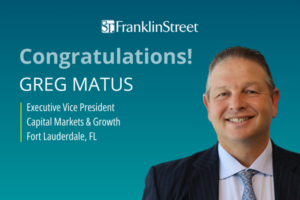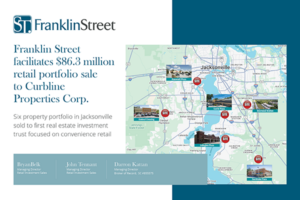ORLANDO—Commercial real estate professionals from around the nation agree on at least one thing: Florida’s retail market is one to watch.
Indeed, demand for retail lease space is outpacing supply and according to Brian Bern, a senior director of real estate services at Franklin Street, it has become a challenge for tenants looking to enter or expand in the market due to a lack of availability.
“The market has clearly shifted to favor the landlord, and rental rates are rising as available space compresses,” Bern tells GlobeSt.com. “As this year’s ICSC Florida conference approaches, we wanted to take a look at leasing efforts, which tenants are expanding and which parts of the market are fairing best.”
The topic of rising rents is one that’s on everyone’s lips. It’s true that the retail market in Florida, and especially metros like Orlando, Miami and Tampa, has tightened drastically.
“With more tenant demand for space than supply, the market has been in favor of landlords for close to a year,” Bern says. “Landlords are getting aggressive with raising rents on spaces that are available for lease.”
In fact, he says, in some cases rents are pushing beyond the highs of 2006 and 2007. At the same time, landlords are having an easier time finding replacement tenants for those unable or unwilling to pay the rising rents, he says, especially for class A locations with steady foot traffic.
“In addition, spaces that have been vacant in some cases for years, are finally attracting tenants,” Bern says. “All classes of retail centers are benefitting from the surge in demand.”
As Bern sees it, the lack of retail space and rising rents should drive new development and redevelopments over the next couple of years. Retail construction starts and deliveries are far below the levels seen in 2006 and 2007, which should allow the industry to sustain momentum into 2016 and hopefully beyond.
“At this year’s ICSC Florida conference, we are expecting to hear from developers preparing to pitch new projects,” Bern says. “As new development occurs, some tenants will undoubtedly move from older centers to newer centers, both of which should create some much-needed supply for tenants, particularly fast-casual restaurant concepts, who are struggling to enter a new market or expand.”



